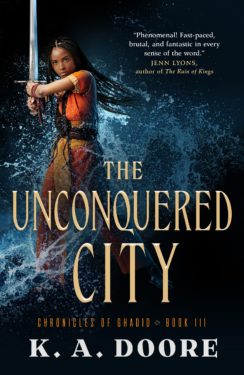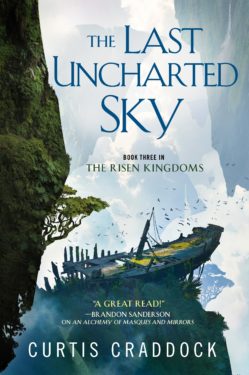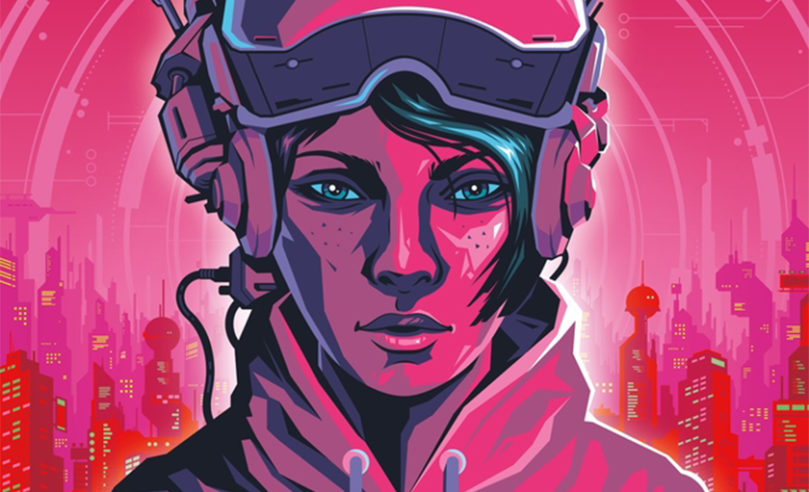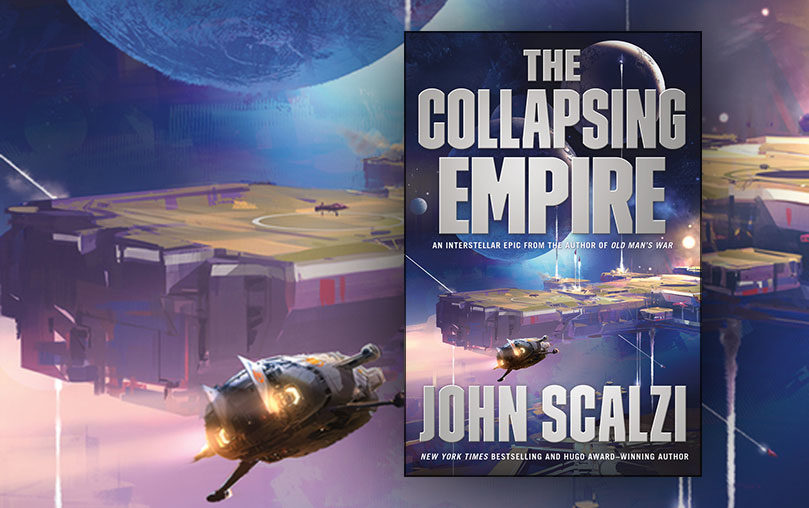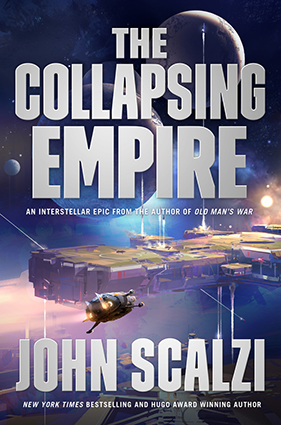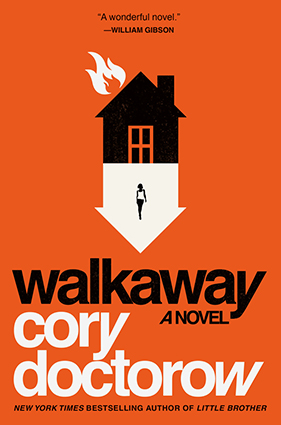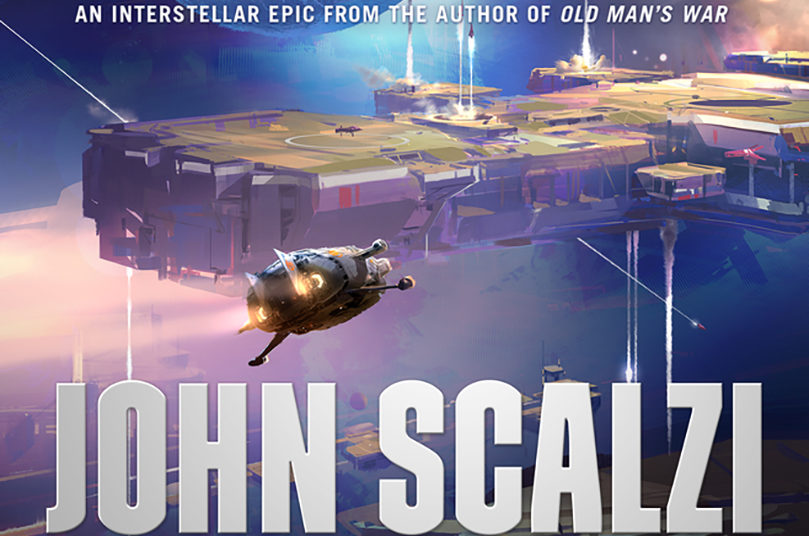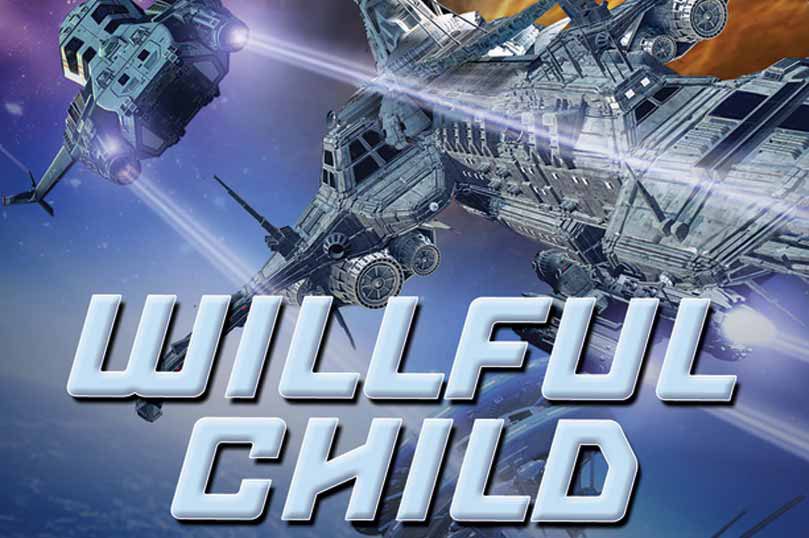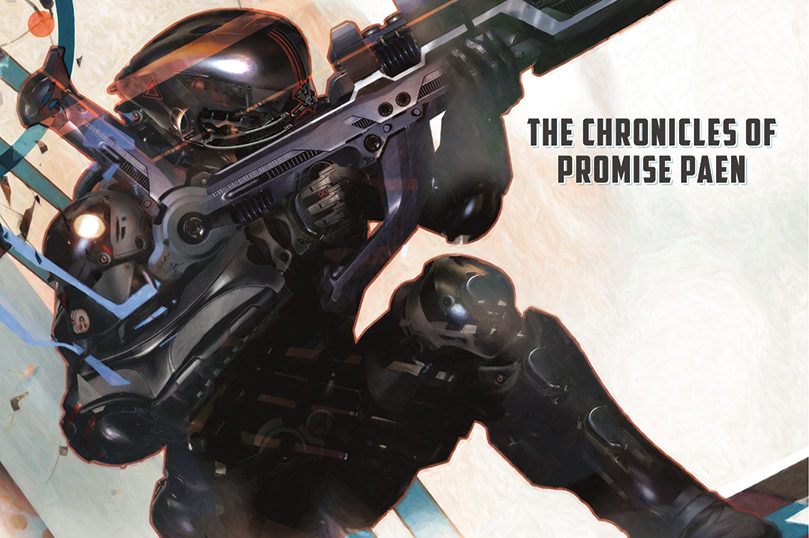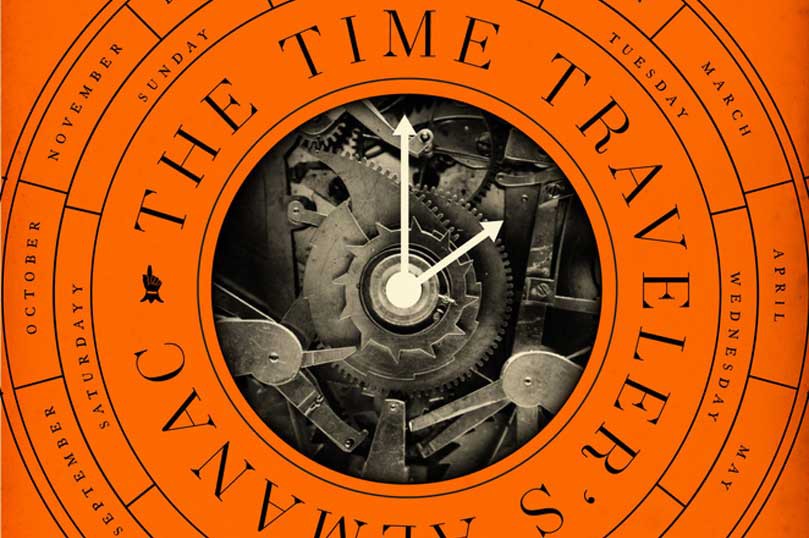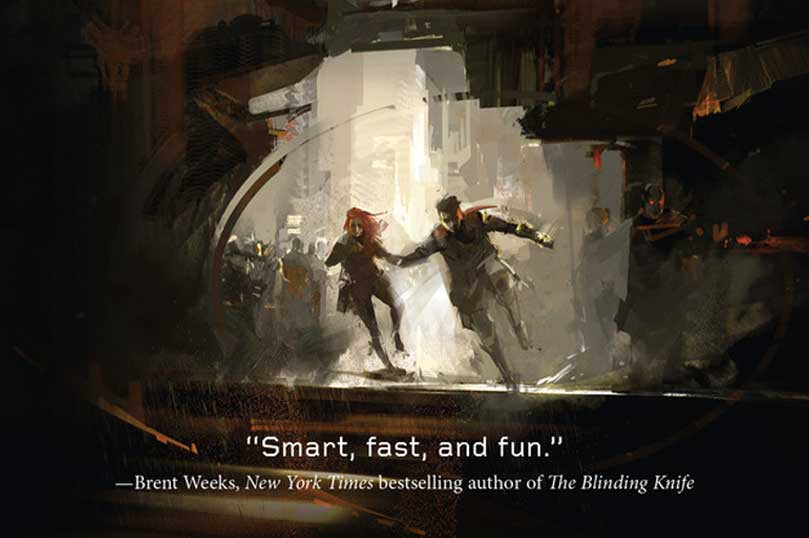




Otaku is the debut novel from former NFL player and tech enthusiast Chris Kluwe, with a story reminiscent of Ready Player One and Ender’s Game.
Ditchtown.
A city of skyscrapers, built atop the drowned bones of old Miami. A prison of steel, filled with unbelievers. A dumping ground for strays, runaways, and malcontents.
Within these towering monoliths, Ashley Akachi is a young woman trying her best to cope with a brother who’s slipping away, a mother who’s already gone, and angry young men who want her put in her place. Ditchtown, however, is not the only world Ash inhabits.
Within Infinite Game, a virtual world requiring physical perfection, Ash is Ashura the Terrible, leader of the Sunjewel Warriors, loved, feared, and watched by millions across the globe. Haptic chambers, known as hapspheres, translate their every move in the real to the digital—and the Sunjewel Warriors’ feats are legendary.
However, Ash is about to stumble upon a deadly conspiracy that will set her worlds crashing together, and in the real world, you only get to die once…
Otaku will be available on March 3, 2020. Please enjoy the following excerpt.
(a Smile like an Open Grave)
“Dragon!”
Wind screams the word with an accompanying burst of gunfire, and my head snaps over to the left. The hulking shape in the center of the room, what I thought might be rockfall or a golemtrap, is slowly unfurling a huge pair of wings, delicate purple veins undulating against the leathery skin. A long neck stretches up into the air, tapered scales running its entire length, and perched atop is the dragon’s death-cold stare. Malevolent red eyes glitter beneath thickly armored brows, and a crown of horns sweeps back from the top of its head. It opens its mouth, revealing two sets of meter-long serrated teeth, and roars, blasting sound at us like a riot suppressor.
“What do we do? What do we do?” Kiro squawks in alarm, his breath labored. It sounds like he’s hyperventilating.
“Stay relaxed. Scatter and ground it.” My voice is calm, but only from years of training. Inside, my heart feels like it’s going to burst through my chest. It’s incredibly rare to encounter a dragon, and the wipe rate against them is close to ninety percent. We’ve only fought one once before, and that was carefully planned out over an entire month. Even then, if it hadn’t been for Brand working miracles in support, we would’ve failed.
Nothing you can do now, except fight your way through. Just another encounter.
I sprint to the right, keeping away from the magma vents and maintaining my distance from the giant wyrm. Adrenaline surges, the old fight or flight instinct kicking into gear, and I flip my assault rifle up, thumbing off the safety. I focus on my sights and loose a chattering series of shots on the run, aiming for the dragon’s wings. Several impact the worm-like veins, but only open small holes—our tech weapons still weakened by the rules of Everdark. Not good. If we don’t keep the beast from getting airborne, we have no chance. We learned that the hard way last time.
“Kiro! Ranged buff, now!”
An orange glow suffuses the air around my tactical rifle, but it’s fitful and weak, like a sputtering fire. I curse under my breath—Kiro isn’t maintaining his forms properly, lessening the effect of the spell, which means I can’t afford to miss. I slide to a halt, snug the stock up to my shoulder and cheek, the movement second nature by now, and take a deep breath. Slowly exhale, pause, then gently squeeze the trigger.
Chattering barks fill the air, and my bullets slam home, tracers filling the air with bright flashes. Three of the veins I aimed for wink out, spurts of purple blood falling to the rocks below. The dragon’s right wing goes limp and ragged, unable to maintain its structural integrity. Short bursts of gunfire from the other side of the room indicate Wind and Slend following my lead, efficient as always, trusting that I can handle my side on my own. After playing for this long together, it’s almost like we can read each other’s minds. The other wing shudders and falls. Kiro cowers near one of the back walls, fumbling at the safety on his gun with one hand while trying to maintain the complicated finger motions for the spell with his other. He’s not doing a great job of accomplishing either. At his feet, his anchoring staff lies forgotten.
The dragon screams in rage, rearing up on two hind legs, thrashing its now-useless wings and sending the mist roiling. A spiked tail comes whipping across the ground, and I vault it with one hand, slapping the pebbled skin to give myself a boost over the top of its mass. Jagged tail spines whistle past my body, but I chose my gap carefully, and I land unscathed on the other side. Suddenly, the beast draws in a huge breath, chest expanding out like a balloon. Scales glow cherry red across the front of its torso.
We have ten seconds before someone gets incinerated. Another fact learned the hard way.
“Regroup at Kiro and get ready to group shield,” I yell, integrated comm channel sending my words to the others. The tail comes slashing back in my direction, and this time I tumble underneath. A spike snags my rifle strap, sending the weapon spinning away across the floor, but I use the change in momentum to roll upright and back to my feet.
Thank goodness the quick release clip worked properly, otherwise I’d be a red smear on the rocks right now.
I dash over to Kiro, huddling fearfully near a vent, the ironsights on his rifle bobbing through a shaky figure eight. He’s panting in sharp gasps, hyperventilating, hindbrain instincts exerting control. I slap him across the face.
“Kiro! Drop your gun and get ready to shield! We’ll support, but you’ve gotta initiate it!”
“I . . . it’s . . . dragon . . .” His rifle drops back against his chest and he kneels for his staff, clutching it like he’s going to be sick.
Wind and Slend run up next to me, breathing slightly heavier than normal. Slend reloads her rifle, grabbing an armor-piercing magazine from her ammo pocket and slotting it home with smooth, economical motions. Wind pulls a belt of grenades out of one of her pouches, like a magician’s trick, and straps them around her waist. She looks away from the dragon and groans, seeing the whimpering form of Kiro huddled on the ground.
“Dammit, Ash, I told you he was gonna be trouble. We’re gonna wipe for sure, and on a dragon, too. What a useless waste of time. This could’ve made us rich.”
“Shut it, Wind. He’ll come through for us. You’ll see.” I grab Kiro’s forearms, trying to get him to look at me. “Kiro. I know this is pretty heavy for your first encounter, but you have to raise a shield. Otherwise, we’re toast. We have about . . .” I quickly glance at the enraged dragon. “. . . three seconds before we’re charcoal. C’mon. I know you can do this. Focus, just like we practiced.”
A moment of silence fills the cavern, the dragon’s steam whistle intake of breath suddenly gone. I look over again, seeing the tiniest wisps of flame starting to leak out of the corners of its mouth, and swear. My hands move, seemingly of their own accord, starting the motions of a barrier, but it’s pointless. I don’t have enough specialization in applied defensive magic to keep us safe if I’m the spell anchor, and Kiro’s staff isn’t attuned to me. Wind sighs dramatically.
“Fucking newbies . . .”
A broad hand brushes me aside, interrupting my cast.
“No. I . . . I can do this. I can.”
Kiro steps in front of us, then slams his staff into the ground. A minor shockwave ripples out, tiny dust waves undulating across the floor. His hands blur into motion, creating the impossibly complex forms required to initiate a max level group shield spell, the now-unsupported staff floating gently above the ground, a solid pillar of brightening green runes crawling along its length.
“Get in support positions!” My voice is halfway between a yell and a cheer.
Good job, Kiro. I knew you could do it.
Wind and Slend take positions to either side. I run behind Kiro, completing the diamond formation, and prepare for impact. Above us, a massive fireball descends.
Kiro finishes the final hand gesture and crosses his wrists in front of him. We all copy him, bracing one foot behind our bodies. Beams of light flash from us to the staff, and then a shimmering blue wall flashes into existence, between us and the descending torrent of flame. A millisecond later, it hits like a crashing tsunami.
Raw force slams into my arms, the sheer power of the dragon’s fire eliciting an involuntary grunt. Straining, I push back against the brutal pressure, keeping my section of the shield firm. My shoulders and core muscles quiver beneath the stress, and I scream out in defiance.
Magic in the Game is reflected by three elements—physical dexterity to create the proper forms; raw strength proportional to the level of the spell being cast; and the force of will to endure the pain for as long as it takes. A max rank shield spell will withstand anything, as long as our flesh doesn’t give way. If it does, if we fail to hold the appropriate form against the requisite burden, then the spell crumples, along with our bodies. In situations where a max rank shield spell is required, that means a wipe.
In front of me, the other three push out as well, muscles bulging. Tears are leaking from the corners of Kiro’s eyes. As the anchor, he’s bearing the brunt of the attack, an onslaught of crushing weight trying to smear him into the ground, and if we weren’t sharing the load, the dragonflame would’ve breached the shield almost instantly. Even the strongest Gamer in the world isn’t strong enough to withstand close to a ton of pressure.
Incandescent heat spreads across the pale blue of our barrier, a half-dome covering our braced forms. Rock melts and flows in a circle around us, but the shield stays intact, keeping us safe in our tiny island. Sweat pours from my brow, but I ignore it. If I didn’t want to push myself, I would’ve stayed in Candyland. Finally, mercifully, the fire ends, the smothering weight falling away.
“Wind, Slend, draw its attention. I’m going for the tail. Kiro, move! Don’t stand in the fire!”
We split apart once more, Kiro narrowly avoiding a magma eruption at his feet by diving out of the way. Hissing superheated rock shoots into the air behind him, a deadly fountain barely missing his leather boots. It cools and solidifies into a new layer on the ground. I shake my head at his narrow escape.
You gotta pay attention to environmentals, Kiro. That’s how most parties wipe.
I notice glowing cracks beneath my feet and sidestep a magma eruption of my own, then turn my attention back to the dragon.
The creature is fully mobile now—twenty tons of murderous muscle atop four dextrous limbs, each equipped with an opposable digit and talons the size of a scimitar. Of course there’s also the prehensile tail covered in needle tipped spines, and the flamethrower system in its throat. Dragons don’t mess around. Murderous red eyes track my movements, singling me out as the most dangerous target.
I dodge a casual swipe from its claws, waiting for Slend and Wind to get into position. Once they distract it, I should have a free run at the tail. Killing a dragon is a matter of taking away its weapons, one at a time, in a very specific order—wings, tail, claws, throat; gradually wearing it down until all threats are neutralized, with no room for error.
Slend bellows at the creature, taunting it to attack her, and it spins in place, surprisingly agile for such a large beast. She waves her axe at it, drawing its attention. To her side, I can see Wind pull the pin on a flashbang from her grenade belt. The flashbang won’t really hurt the dragon, but it’ll confuse it for the bare moment I need to sever the nerves at the base of its tail. My blade slides into my hand naturally as breathing, the worn leather grip comforting in my palm. It’s nothing special, just a fifty centimeter piece of metal designed to cut what I want it to cut, but the sharpened steel is an extension of myself, a familiarity earned from years of practice.
Slend blocks a claw swipe, using her axe to beat the scaled mass of the dragon’s paw to the side. Behind her, Wind cocks her arm back and throws the flashbang, alert for the opening. The dragon smiles like an open grave.
My eyes narrow. Dragons don’t normally . . .
Shit.
“It’s a dev! We’re being featured!”
Glowing golden runes appear on the walls, cutting away the steam and turning the cavern into a massive arena. Fast paced music bursts into the air, heavy on the guitar riffs and choral melodies, a thrumming bass line syncopating like a heartbeat. Another rune, this one electric blue, appears above the dragon’s head—the sigil of whichever dev has taken over the program that normally runs the monster’s reactions. In this case, the twisting lines let me know that it’s Hammer. I grimace. He and I have history, and he’s been itching to take me down.
Of all the top tier devs in Infinite Game, Hammer’s the best, and he hates letting players win. Especially with an audience. Judging by the runes on the walls, there’s at least a million viewers tuning in for the showdown. We must be the first guild to make it this far after the new patch, and I’m sure GameCore has been hyping this on the global ’Net since we started the run. I’ve been running my personal stream, of course, but that’s a drop in the ocean compared to the attention GameCore commands. Ashura vs. Hammer, come one come all, get your tickets at the door. I know without looking that a jade green sigil is floating over my head, the swirling frozen explosion of my guild tag. The SunJewel Warriors.
Fighting devs is always a risky proposition, because they never react like the normally programmed responses in an encounter. It can be a lot of fun in social events, because then you really feel like you’re interacting with living beings, but in the combat events it creates a dangerous unpredictability. Even worse, devs are the ones who design program behaviors, so they know the best way to subvert everything a player’s learned about a specific encounter. The good ones have a nasty habit of studying previous strats the leaderboard groups use, so they’re prepared to counter everything we normally do. The best ones, like Hammer, have an uncanny ability to get inside a non-human skin, and make it do something unexpected.
Lightning quick, Hammer flicks his tail and bats the grenade directly back at Wind, causing it to detonate in front of her face, a move no dragon’s ever pulled before. Stunned, she falls to her knees, hands blindly groping through the air. Ignoring Slend’s taunts, the dragon swipes Wind with an open palm, slamming her furred body into the cavern wall in a cloud of dust and flying rocks, then grinds its taloned hand in a circular motion against the wall. A bloodied pile of meat slowly slides to the floor, the once agile fox now roadkill.
“Fucker! That hurt! Fucking fuck, I hate fighting devs. Watch the tail, Ash.” I hurdle the whipping tail once again, Wind’s high-pitched voice sounding in my head like the voice of a disembodied phantom. Which, essentially, is what she now is.
Dying during an encounter ghosts a player for as long as the encounter persists—able to relay information to teammates, but unable to physically interact with anything. Some games fade the screen to black and mute communications, so the dead player can’t call anything out, but in Infinite Game, the devs figure if you lose somebody in endgame, you’re going to need all the help you can get.
I dodge a crushing stomp from one of the dragon’s back legs and flick my blade out, aiming for the tendon controlling its foot. Metal sinks in deep, but not enough to fully sever the iron-like tissue. It’s enough to injure that foot, though, and Hammer roars in fury. I spend the next several seconds weaving between claws and tail whips, contorting my body through impossible poses—katas learned from Mom long ago, practiced religiously every day, like dryburb prayer sessions. Hammer’s head darts down away from me, adder-quick, and magma erupts in the background. More runes appear, the music increasing in volume.
“Slend, try and get it off me!”
“Can’t, boss. Got et. Fucker’s fast.”
“. . . Shit. What’s Kiro doing?” I backflip over the tail, slicing through scales and nerves in a blurring strike. The last third goes limp, but I’m not close enough to get the upper nerve clusters that control the whole length of the tail. Hammer roars and spins again, trying to impale me with concentrated lances of flame from the dragon’s mouth. I quickly dodge, bobbing and weaving across the rocky floor, molten puddles congealing behind me.
“. . . I’m dead too.” Kiro’s voice is glum. “Was trying to shield Slend, and I forgot to watch the floor. Magma eruption.”
“Fucking newbies,” Wind says, exasperated. “Well, Ash, looks like you get to one vee one a dragon. Something that’s literally impossible. Have fun with that. Oh, and there’s only about five million people watching now, so you’re doubly fucked. Hammer’s gonna get paid.”
“Great,” I groan.
“Why don’t you just bail, Ash?” Kiro asks softly. “You’ll only drop a couple places. It’s a lot safer than trying to take a dev. Besides, there’s no way you can beat a dragon by yourself.”
“The hell I’m running from a fight, Kiro, and the hell I’m letting Mikelas’ group of boardshits win this season,” I snarl. “Not gonna happen. Don’t distract me.”
A petulant sigh is his only response.
In front of me, Hammer rears up, planning to flatten me beneath the dragon’s bulk, and I sprint forward, aiming between its massive hind legs. His shadow starts descending, and I push my muscles even harder, hoping I don’t tear a hamstring. Luckily, my body accedes to my demands, and I dart out from beneath the crushing weight, blade flickering from side to side. This time, I get both tendons cleanly, crippling Hammer’s movement. The dragon’s torso comes crashing down, causing the ground to shake.
Without breaking stride, I plant my sword in the side of Hammer’s tail, and use it to swing myself on top of his armored hindquarters, searching for the weak juncture between plates. A quick thrust and twist, and the rest of the tail goes limp. Hammer bellows, shaking his body, throwing me off, but I convert my fall into a dive and spring upright, spinning to face the angry beast rolling around on the floor. Even more runes pop into existence, the walls now almost completely covered with curving glyphs. The music increases in intensity.
“Just another encounter,” I whisper, heart thudding in my chest in time with the mantra. “Just another encounter.”
Wind lets out a low whistle. “Holy shit, Ash. Not only did you outrun a bodyslam, you turned it into a tail crit. You should’ve been dead, there.”
“‘Aten’t dead yet,’” I mutter, thinking of one of my few heroines. “What’s it look like damage-wise?”
“Closer to even,” Wind responds, her voice rising with excitement. “Mobility’s gone, bleeding heavy from the wings. Flame breath’s still in play, but you should be able to dodge that.” Her voice goes even higher. “No one’s ever soloed a dragon before. Especially not one controlled by a dev. The viewrate is skyrocketing. You pull this off, and we’re rich. Fuck, we’re already rich from the split, even if you wipe.”
“It’s not over,” I say, spinning my blade absentmindedly. “That was the easy part. Hammer wants to get paid, too. He’s gonna back himself into the exit and make me come to him. It’s what I would do.”
As I say the words, Hammer does exactly that, pushing the wounded rear of the dragon into a notch in the cavern walls, talons digging deep furrows in the cooled lava floor. He props his head on his front legs, like a dog resting on a carpet, and stares at me. Waiting. A grin snakes across the crocodile face, revealing long yellow teeth stained with blood, and a pointed tongue licks scaly lips.
“Feeling lonely, Ashura?” The dragon’s voice sounds like crumbling bone, Hammer relishing the moment, playing to the crowd. “It’s only half your progression if you give up now. You’ll still be top three, top five at worst. Save yourself the humiliation of a full wipe. It’s the smart thing to do.”
“And let you knock us out of first? Go back to Candyland, Hammer. That’s more your pace.”
I know how to play to the crowd too. More glyphs burn into existence, news of the encounter viraling across the ’Net like a plague, socials close to crashing under the commentary.
“Besides, when I kill you, we’ll clinch the ladder for this season. Dragons are worth triple, not even counting the dev bonus.”
“When you kill me, Ashura?”
Hammer laughs, long and low. My mind races, trying to think of a viable strategy against a monster twenty times my size. I have a vortex grenade in my inventory, but that’ll kill me just as quickly as Hammer in an enclosed space like this, and we don’t get the win if the entire party’s dead. My rifle’s too far away to reach cleanly, and Hammer will be expecting that. I still have my blade, trusty tool for so long, but—
“Ash! Look out!”
“Don’t distract her, newbie!”
Kiro’s voice is shrill in my head, Wind’s admonition slightly less piercing, but I’m already moving, deeply ingrained instincts slamming my body into motion.
Smoldering orange-yellow cracks appear beneath the back third of the room, centered where I was just standing. Magma vents shriek and hiss, belching more hot rock into the air, and I leap forward, desperately trying to clear the edge of the fractured lines. My feet barely make it out of the danger zone before a full third of the room explodes into lava, massive geysers shooting from the floor. Heat sears my back—nothing damaging, but uncomfortable all the same.
Diving forward, I tumble once, then push off the ground with my right foot and arm, cartwheeling to the left. A taloned hand slams into the space I just vacated, cratering the rock again and again, always a bare instant behind. I manage to get a couple attacks in on Hammer’s paws, but the shallow cuts don’t do much more than irritate him. Finally, I create enough room to back out of the threat space directly in front of the dragon.
“Not bad,” Hammer says conversationally, “but how long can you keep it up? Your body has to be getting tired. Wipe timer’s counting down, too.”
Unfortunately, he’s right. Another lava eruption behind me punctuates his statement. It’s closer than the previous one, lessening the amount of available maneuvering area, and more are on the way. Devs don’t let you dick around in an encounter forever. My sides ache from oxygen debt, my muscles are on fire, and the whole chamber is going to be full of boiling magma pretty soon. I have to end this quickly, but how . . . ?
Hammer yawns, exposing the wet pinkness of the dragon’s throat.
“Looks like I win this one, Ashura. A pity. You’ve been worthy prey.”
That’s when it hits me. The passageway leading in—of course. No one’s tried it before, because it’s a horrible idea, but it makes sense within the Game’s logic. There’re always clues to the encounter, for those who pay attention, and there’s always more than one way to win. Successfully pulling it off, though, is going to require some finesse, and no small amount of luck.
Time to play Jonah. The gummies are gonna love this.
“Slend,” I subvocalize on our private channel. “When the dragon ate you, where were you positioned?”
“Underneath chest. Claws don’t reach. Uses mouth.”
“Perfect. Any tells when it came down?”
“Black eyes. Shark eyes.”
“Got it. Kiro?”
“Yeah?”
“Be quiet. Don’t distract me.”
Another angry huff.
Lava erupts again, bare centimeters from my spine. Time to move. Above and around, the cavern walls are almost pure gold, glyphs covering us in a dome of brilliance, millions upon millions ignoring whatever grips them in the real, instead watching me in the spotlight. The twinge of nerves and adrenaline hitting my stomach is like the purest high in the world, banishing all sensation of pain. If I make this work . . .
I reverse the sword’s grip in my hand, setting the blade back along the length of my forearm, dull side in, chisel point almost touching my elbow. A lone stringed instrument sustains a high note, the entire cavern seeming to hold its breath. My hamstrings and calves tense, muscles coiling, and then, almost unthinkingly, I’m in motion, feet gliding over the rocky ground. My mind falls into the dreamlike state of full combat, at one with my body, reactions coming before my brain even has time to craft a response.
Hammer attacks, swiping with one clawed hand, but he’s not fast enough to do more than ruffle my hair with the wind of its passing, talons brushing past my face scant millimeters away. I continue my sprint, then roll to the side, avoiding a swing from his other hand. That one passes by my feet, slicing a thin layer from the bottom of one boot, a sliver of my sole. I plant my left foot and push myself back upright, running directly toward the copper-green chest of the dragon, momentarily left open by Hammer’s lunging sweeps. Lava bursts behind me, but it’s a distant thunder in my ears. Flame lances blast the ground, cratering explosions nearly lighting me on fire, but the shifting movement pattern I’ve adopted helps me avoid a direct hit.
It’s like running a hundred meter sprint through hell.
The last lance explodes behind me, and I stagger to a halt directly beneath the dragon’s chest, breathing hard. A towering head stares down at me, nearly twenty meters up, swaying back and forth on a supple neck. With a sudden rush, scaly arms slam down behind me, blocking off any retreat. Hammer chuckles.
“Impressive, but now there’s nowhere left to run, is there?”
Blood spattered lips peel back to reveal stained fangs once more.
“I will relish this moment. The mighty Ashura, finally brought low, your reign atop the leaderboards ended. Any last words?”
I smile tiredly, adrenaline high gone, lactic acid burning my legs and arms, cramps threatening to seize my limbs, but my blade steady in my hand.
“Yeah. Eat me, Hammer.”
Double rows of teeth shine in the blinding light of glyphs surrounding us.
“With pleasure.”
A nictating membrane slides over the dragon’s eyes, turning them the dead black of a burnt out viewscreen. I summon up the last of my reserves, willing my body to obey me one last time, fighting through the toxic byproducts of my own muscles.
“Ash!”
Kiro’s voice sounds in my head simultaneously with the dragon’s strike, but I can only focus on one thing right now, and it has to be the descending maw. Time slows, the gaping mouth growing larger and larger in my field of vision. I suck in a deep breath, lungs pressed to bursting against my chest. Right before the rows of teeth seem ready to close on my upper body, I jump, arms extended above me, pushing with every ounce of strength I possess, my own lips pressed tight.
The warm wetness of the dragon’s throat engulfs me, closing around my body like a fleshy glove, pressing in from all directions. I feel teeth snap beneath my feet, but Hammer is too slow. With a snarl, I plunge my sword into his ridged gullet and pull myself deeper into the fetid tunnel.
Hot air swirls around me, the noxious fumes stinging my eyes, but I keep going, stabbing the blade in again and again, kicking my feet for purchase, holding my breath to avoid being poisoned. Acid burns along my exposed flesh, corrosive digestive juices breaking down my skin, but I wall the pain away. I can feel the dragon spasm and shake, Hammer frantically trying to dislodge me from his throat, but I go deeper, worming my way forward. Frozen breath hammers my lungs, carbon dioxide starting to build up to dangerous levels, and finally I feel an opening in front of my outstretched hand. Silently, I thank the hours spent learning the anatomy of creatures that live only in imagination.
Not much time left before you suffocate. Stomach’s in front, which means the heart should be . . . there.
Two quick cuts, my blade’s keen edge slicing an opening in the striated esophagus lining, and I reach through to feel the pulsating wetness of the dragon’s heart, a thickly muscled mass almost as big as a child. Another slash opens it up, hot blood gushing out in torrential spurts. The sword’s handle grows slick in my hands, Hammer’s thrashing death rattles nearly jarring it loose, but the comforting grip doesn’t fail. It never has.
I keep cutting and pushing my way forward, metal sliding through muscle, then fat, then finally skin, oxygen deprivation spots flashing against my eyelids, and suddenly I’m sliding wetly from a slit in the dragon’s belly—a shockingly violent birth.
The brimstone air of the cavern fills my lungs. It’s the sweetest thing I’ve ever tasted. Sobbing, laughing, shuddering, I stagger to my feet and howl victory at the overwhelming glyphic light, brandishing my sword like a talisman, dragon blood streaming down my arms and face, bathing my body in a gory shroud. I am scalded, burnt, not quite whole, yet wholly alive. Magma explodes around me, triumphant horns making the very air shake, and though I can’t hear the roar behind the glyphs, I know that it’s there nonetheless.
Just another encounter.
Copyright © 2020 by Chris Kluwe
Pre-Order Your Copy





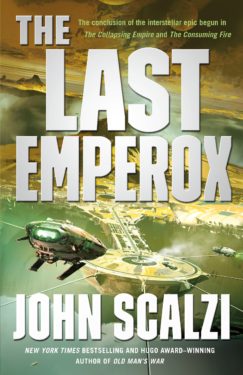 Space cultures are all GREAT…right? John Scalzi, author of The Last Emperox, might have to disagree with you there. Check out his full argument below!
Space cultures are all GREAT…right? John Scalzi, author of The Last Emperox, might have to disagree with you there. Check out his full argument below!
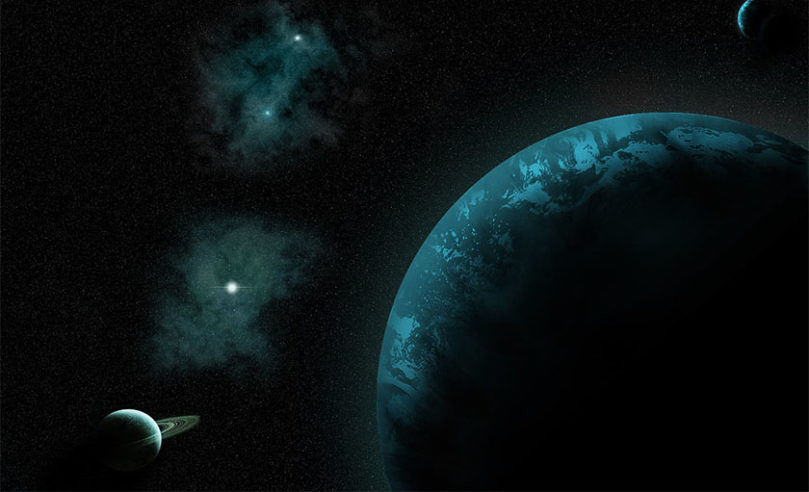





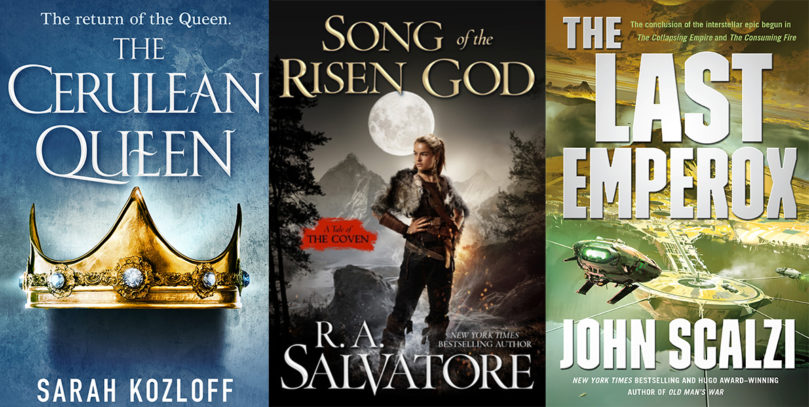
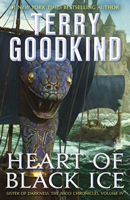
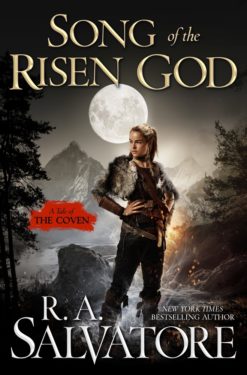
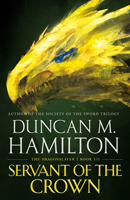
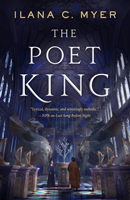

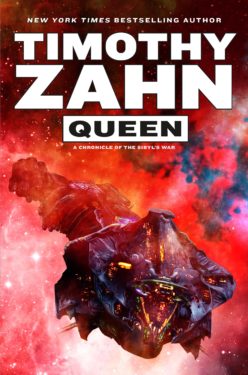
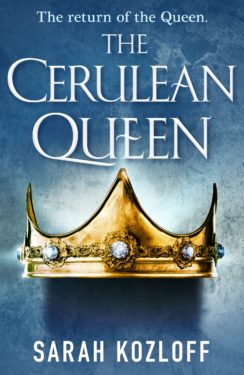
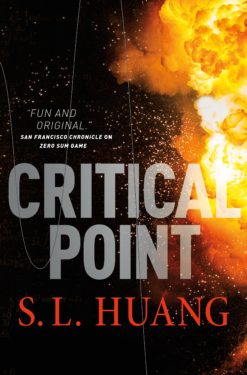
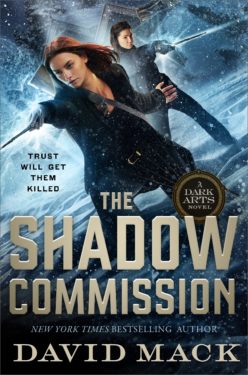 The Shadow Commission – The Dark Arts Trilogy – David Mack
The Shadow Commission – The Dark Arts Trilogy – David Mack